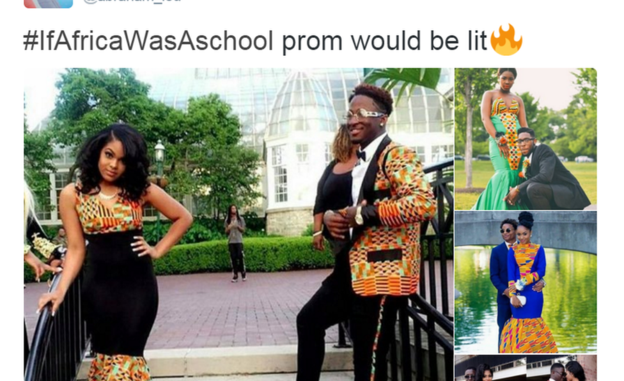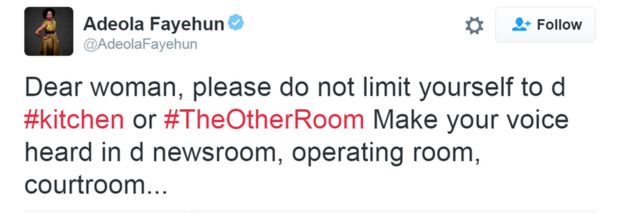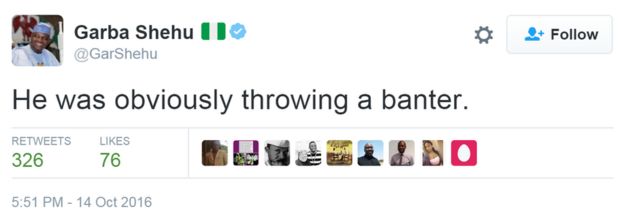
Whether mourning the death of a musical giant, teasing presidents or launching protest movements, Africans took to social media in greater numbers than ever before in 2016. Here’s a look back at some of the most popular stories and hashtags.
#TheOtherRoom
The moment the words came out of Nigerian President Muhammadu Buhari’s mouth, you just knew that the internet was going to go into meltdown.
Questioned about stinging criticism made by his wife Aisha Buhari in an exclusive interview with BBC Hausa, the president offered the following response:
“I don’t know which party my wife belongs to, but she belongs to my kitchen and my living room and the other room.”
It was not a sentiment that was ever going to endear the Nigerian leader to feminists the world over.
But choosing to say it while standing next to German Chancellor Angela Merkel, arguably the most powerful woman in the world, supplied the radioactive material needed for a truly nuclear PR fallout.
Women from Nigeria and many other parts of the world condemned Mr Buhari’s comments as outdated, inappropriate and downright offensive:


Just as a Twitter firestorm began to rage around the president, with thousands criticising his comments and interpreting his reference to “the other room” as a piece of shabby innuendo, his spokesperson arrived to douse the flames.

Or not. Cue more anger from those incensed that the president’s team would were making light of the comments instead of apologising for them.
The drama around the president’s outburst was such that some thought it should be given the Nollywood treatment.
Pretty soon, a fake poster for the proposed film was doing the rounds.
Mr Buhari may be relieved that despite the promised 29 October release date has now passed, without (as far as we know), any sign of an actual film.
#IfAfricaWasASchool
A worthy sequel to 2015’s #IfAfricaWasABar trend, thousands of Africans embraced the “If Africa Was A School” premise, first put forward by a Malawian Twitter user:
Many used it as a playful way to explore different aspects of African identity, or to challenge stereotypes about the continent.
Some imagined the improvement that African fashion could bring to the traditional ball-gowns and black tuxedoes worn to prom by high-school leavers in the US:
Others were more political, like this tweet taking the school metaphor to highlight the link between the colonial plunder of Africa in the past and the underdevelopment of many countries on the continent today:
#OromoProtests and #AmharaProtests
Ethiopia’s two largest ethnic groups, the Oromo and Amhara, were using these hashtags for months to bring attention to their protests over economic and political marginalisation.
They accused the government of killing hundreds of demonstrators and arresting thousands in brutal crackdowns.
But in August, when Ethiopia’s Olympic marathon silver medallist Feyisa Lilesa, himself an Oromo, crossed his hands above his head in a gesture of protest as he crossed the finish line in Rio, the world’s media sat up and took notice.
“The Ethiopian government is killing my people so I stand with all protests anywhere as Oromo is my tribe. My relatives are in prison and if they talk about democratic rights they are killed,” he said.
One Ethiopian activist on Twitter compared Lilesa’s actions to the famous black power salute made by two American athletes at the 1974 Olympics, when they staged a silent protest against racial discrimination:
Lilesa was named in Foreign Policy Magazine’s top 100 global thinkers for 2016, which praised him for “breaking the rules of the games” by staging a protest at the Olympics.
He is now living in exile in the US, having said he feared he would be killed or imprisoned if he returned home.
But protests have continued in his home country, with more than 24,000 people arrested since the government introduced a state of emergency in October – half of whom remain in custody.
#BringBackMutharika
When Malawian President Peter Mutharika failed to return home for several weeks after going to New York to speak at the UN, some of his compatriots launched a campaign to try and locate him.
With no word from the government, rumours quickly spread about the 76-year-old leader’s health, with some saying he was receiving treatment for a serious illness at a US hospital.
Not so, said the government, breaking its silence after several days to dismiss the “baseless, malicious and sickening” reports.
Mr Mutharika was “fit as a fiddle” and holding important meetings in the US, his spokesman insisted.
When the president did eventually return home on 16 October, after an absence of almost a month, he greeted his well-wishers at the airport only using his left hand, prompting further rumours that he had had a stroke.
But five days later, he waved with both hands to the media to demonstrate his strong health, putting his restricted movement down to a bout of rheumatism.
He even boasted that he felt so good he could do 12 rounds with Malawi’s world boxing champion Isaac Chilemba.
That wouldn’t be necessary, Chilemba said.
“I will spare him such agony by knocking him out in under 10 seconds.”
#RIPPapaWemba
In a year that claimed some of the world’s most beloved music artists (Prince, David Bowie, Leonard Cohen), Africa also lost arguably of one of its biggest cultural figures: Congolese singer Papa Wemba.
Tributes poured in on Twitter for the man from the Democratic Republic of Congo whose pioneering blend of African, Cuban and Western sounds became one of Africa’s most popular music styles in the 1970s and 1980s.
“Papa Wemba! Africa loses another one of its ambassadors,” tweeted renowned Senegalese musician Youssou Ndour.
Cameroon football legend Samuel Eto’o took comfort from the way Papa Wemba died, having collapsed on stage while performing at a music festival in Ivory Coast:
“This monument of Africa had such a great love of music that he served it even in his passing,” he tweeted (in French).
Kinshasa rapper Youssoupha also highlighted the impact Papa Wemba had beyond music, with his sense of fashion inspiring a generation of dandies, or sapeurs, to dress elegantly regardless of their wealth or background.
“He was the icon of our culture, of our lifestyle… This is a huge loss,” he tweeted.
The best of the rest:
- #StopRacismatPretoriaGirlsHigh
When black pupils at the Pretoria Girls High school in South Africa protested over teachers allegedly telling them to straighten their hair and banning them from having afros, it reignited a national debate about race and racism in the post-apartheid nation.
A photo of one of the young students protesting went viral on social media and became one of the most iconic images of the year.
- #ThisFlag
Zimbabwean preacher Evan Mawarire was hailed as a hero and given an outfit to match, for taking on President Robert Mugabe’s government over perceived corruption and economic mismanagement.
- #TBJoshua
Nigerian pastor TB Joshua, one of Africa’s most influential evangelists, prophesised that that Hillary Clinton would win the US presidential election.
As she didn’t it proved to be a gift to his critics on social media, especially when the Facebook post containing the prediction was then deleted.
- #BidoungChallenge
A late entry, but surely worth a mention is this hashtag from December, when Cameroon’s sports minister was mocked by thousands on social media after greeting President Paul Biya with a deep bow.
Cameroonians set themselves a challenge to imitate the extreme pose, with hilarious results.
